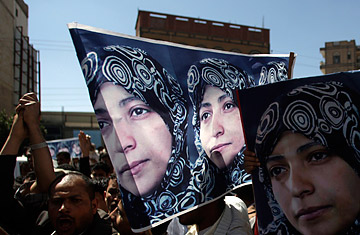
Protesters shout slogans during a protest against the arrest of rights activist Tawakul Karman, outside the Attorny General's office, in Sanaa, Yemen, January 23, 2011. Yemen has arrested Karman who led student rallies against the government in the capital last week, sparking a new wave of protests on Sunday.
Fearing a Tunisia-style revolt, Yemeni President Ali Abdullah Saleh has been desperately trying to appease angry demonstrators and opposition leaders after a week of protests across the country. Following the arrest of a number of journalists and human rights activists over the weekend, the Yemeni government suddenly released them Monday morning after demonstrations flared, demanding their freedom.
Hours after being released, Tawakul Karman, a human rights activist who has become the apparent figurehead of the protests, returned to the demonstrations and vowed to continue fighting to oust President Saleh. "We will continue this struggle and the Jasmine Revolution until the removal of this corrupt system that looted the wealth of the Yemenis," she screamed through a loudspeaker to a crowd of around 1,000 people on Monday, referring to the uprising in Tunisia which toppled president Zine al Abidine Ben Ali earlier this month.
Inspired by the Tunisian uprising, Yemen's small middle class took to the streets last week to challenge the 32-year rule of their President. At Sana'a University the protest marches came to a head Saturday and tear gas was used to disperse the crowds. One hoisted banner read: "Hail Tunisia — the sweet smell of Jasmine woke us up!"
Early Sunday morning, Karman was seized by plain-clothed police and taken to jail, according to her organization. During her 30-hour detention, the demonstrations demanded her release, as well as that of 15 other protesters. "All of Yemen loves her," a protester yelled in English at a demonstration outside the General Prosecutors Office on Monday morning.
Karman has spent the past few years as the controversial head of a non-profit called Women Journalists Without Chains. Every Tuesday, Karman and her supporters demonstrate outside parliament for the release of imprisoned journalists in the impoverished Arab state. Charismatic but stern, Karman has complained of brutality by the army at her weekly protests. She has received multiple death threats. "I got calls from men threatening to throw me from the mountains surrounding Sana'a," she told TIME in a previous interview.
In a country widely criticized for treating women as second-class citizens, Karman became an overnight celebrity — literally — and her arrest brought the largest number of protesters yet. "They arrested [Karman] because they wanted to hide anyone who exposes their corruption," said lawyer Muhammed al Aroudi, standing near a crowd of protesters who taunted riot police. "The people now are not scared of the authority. All the people will become stronger," he added. It is unclear whether demonstrations will continue now that Karman has been released and as protests leaders regroup. But Sana'a residents say the streets remain tense, with an increased police presence.
President Saleh has become a key U.S. ally since Yemen became a launching pad for attacks on the West from Al Qaeda in the Arabian Peninsula, the local wing of the group. Despite winning elections in 1999 and 2006, the President is seen by many Yemenis as the leader of a corrupt government and a puppet of U.S. counter-terrorism. Yemen is the poorest country in the Arab world and suffers from skyrocketing unemployment, depleting water and oil reserves and a lack of political rights.
At the beginning of this year, Yemen's parliament gave preliminary approval to a measure that would allow Saleh to stay in power past the end of his constitutional mandate to serve only two terms, which end in 2013. The move sparked protests across the country, which intensified during the Tunisian revolt.
Speaking at a conference of the armed forces on Sunday, Saleh said it was wrong to link events in Yemen to those in Tunisia and criticized the protesters. "Let us deliberate power peacefully and not by chaos. Yemen is not Tunisia," he said. The President tried to quell longstanding rumors that he would transfer power to his son, describing such statement as "rude." But the President took an unusually apologetic tone at the end of the speech. "I would ask for pardon from the people if I made mistakes or I fell short of my duties, only God is perfect," he said. In a move to calm discontent, Saleh affirmed that the presidential mandate is limited to two terms only.
The Tunisian turmoil has sent a chill down the spines of many Arab leaders. Local media reports Saleh has since slashed income taxes in half and instructed his government to control prices. Particularly revealing were Saleh's closing comments at his speech Sunday, where he asked military commanders to change their chant from "with soul and blood we protect Ali," to "with soul and blood we protect Yemen." He then agreed to raise the salaries of the armed and security forces by around $23 a month, a significant increase in a country where half the population lives on only $2 a day.
Despite the protest marches, it is not clear how widespread opposition is to the regime — or if Yemen will go the way of Tunisia. At some of the protests there were counter-demonstrations in support of the President. "Civil society is still weak and the regime can offer many concessions. It will not get caught unaware as the Tunisian example," Yemeni political analysts Abdul-Ghani al Iryani told TIME. "However, if the regime does not give the necessary concessions...[it] could bring the people into the street in a way that cannot be stopped." With reporting by Tom Finn / Sana'a
